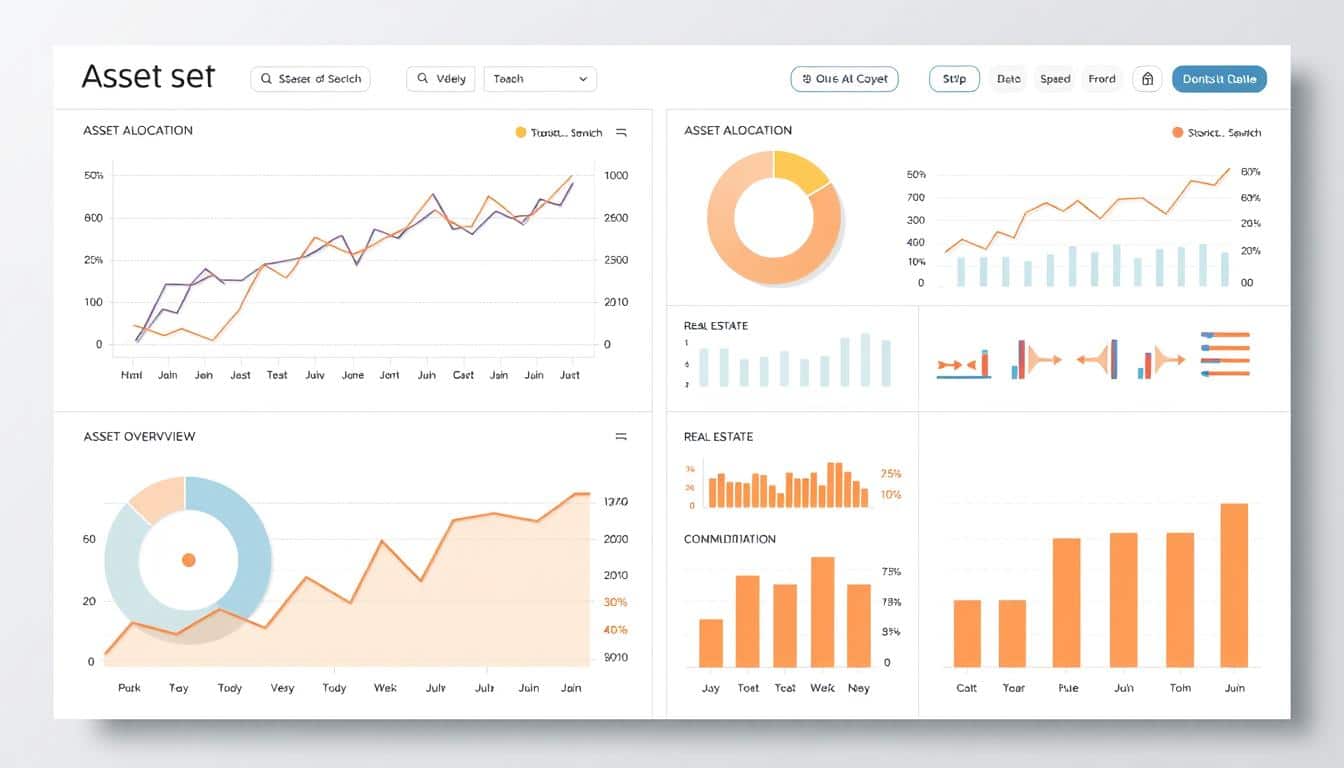Estate planning is super important for protecting your legacy and managing your money how you want. Making a detailed estate plan means you’re looking out for your family and making things easier for them later. It brings comfort knowing everything will be handled smoothly when the time comes.
Understanding the Importance of Estate Planning
Estate planning is key to protecting your family’s future. It helps you decide who gets your assets. This prevents arguments among family members when you’re gone.
Anúncios
Protecting Your Loved Ones
Estate planning gives you peace of mind. A good plan means your loved ones will be taken care of, with less risk of fights. It makes things easier during tough times, avoiding legal issues.
Minimizing Tax Burdens
Estate planning can also cut down on taxes. This means your family gets more of your wealth, keeping your legacy alive. Without a plan, taxes could reduce what your family gets, causing them financial stress.

What is Estate Planning?
Estate planning is about making sure your money and things are handled right when you’re gone or can’t make decisions. It means deciding how your assets get passed on and how your debts get paid off. This planning involves arranging for your wealth to be given to others, and how your debts will be handled.
Good estate plans consider what you want and what your family needs. By having the right legal papers, like wills, trusts, and powers of attorney, you make it easier to pass on your assets. These documents are key to carrying out your wishes about your money and stuff.
Creating an estate plan makes things less stressful for your family when times are tough. It makes your wishes clear and ensures they are respected. It removes doubts about who gets what and helps fulfill your final wishes.
Key Components of an Effective Estate Plan
An effective estate plan includes key parts to manage your assets your way. Knowing these elements helps you make a plan that fits your life and goals.
Wills
Wills are important for saying how your stuff should be passed on when you’re gone. They lay out who gets what and can protect your kids by naming guardians. This way, it lowers family fights and makes sure your final wishes are respected.
Trusts
Trusts are a big deal in estate planning, too. They let you control your assets both while you’re alive and after. Setting up a trust means you can say how your things should be used by others, skipping the need for court. Trusts also protect your stuff from debt collectors and can save you on taxes.
Powers of Attorney
Powers of attorney let you pick someone to make money and health decisions if you can’t. This means decisions about you are made by someone you trust, based on what you would’ve wanted. It’s a way to avoid problems when times get tough.
The Step-by-Step Process of Creating Your Estate Plan
Creating an estate plan involves several key steps. You’ll want to make sure it covers all your assets and wishes. First, assess all your assets to understand what you own. This is the base for a solid estate plan.
Assessing Your Assets
The first step is assessing your assets. Think about all kinds of assets, including:
- Cash and bank accounts
- Real estate properties
- Investments like stocks and bonds
- Personal belongings such as jewelry, art, or collectibles
This helps figure out your estate’s total value. Then, think about how you want to share these items.
Identifying Objectives
After listing your assets, figure out your goals. Decide how to use your assets and who should benefit. You might think about:
- Providing financial support for family members
- Minimizing estate taxes
- Ensuring that charitable donations are honored
Your goals will give your estate plan its shape, guiding your next steps.
Choosing an Executor
The final step is picking an executor. It’s essential to choose someone reliable to carry out your wishes. The ideal executor has qualities like:
- Reliability
- Organizational skills
- Ability to communicate effectively
This person will settle debts, share your assets, and meet legal needs. Your choice of executor is a vital part of your estate plan.
The Role of a Will in Estate Planning
A will is key in planning your estate, ensuring your wishes for asset sharing are respected after you’re gone. It lists who gets what, making it clear how to divide everything. By making a will, you can pick guardians for your kids, helping them stay cared for.
Having a will also means fewer problems when settling your estate. It clearly states what you want, which helps avoid fights among heirs. You should get legal advice to make sure your will follows state laws. This makes sure it works as you intended, sharing your assets how you want.
Choosing Between a Will and a Trust
It’s important to know the differences between a will and a trust for good estate planning. Each has its own benefits for different needs and goals. People should look at what each option offers to pick the best one for their situation.
Benefits of a Trust
Trusts have several advantages that make them a good choice for planning your estate. Some key benefits are:
- Avoiding Probate: Trusts allow assets to be passed on without the probate process.
- Privacy Protection: Trusts keep the details of estate distribution private, unlike wills that are public.
- Tax Benefits: Some trusts can offer tax benefits to both the one who creates the trust and the beneficiaries.
- Flexible Management: A trust manages assets during the owner’s life and after death, according to set terms.
Key Differences between Wills and Trusts
The main differences between wills and trusts are crucial to the will vs trust discussion. Consider these points:
- Timing of Effectiveness: Wills are only valid after death, but a trust is active during the owner’s life and after.
- Asset Control: Trusts allow more control over how assets are distributed, letting you set specific conditions.
- Cost and Complexity: Setting up a trust is usually more expensive and complicated than making a will.
- Probate Necessity: Unlike trusts, wills have to go through probate, which can delay and cost more.
Selecting Beneficiaries and Guardians
Choosing who will get your assets and look after loved ones is key in planning ahead. It helps avoid disagreements and makes your wishes clear, keeping your family safe. This careful choice matters a lot.
Designating Beneficiaries
Being clear about who gets what after you’re gone is crucial. You must think carefully about who should get your assets. This means looking closely at your relationships, financial matters, and legal duties.
To make things easier, follow these steps:
- Look over all your assets, like bank accounts, insurance, and retirement savings.
- Figure out which beneficiary can handle the benefits well.
- Talk to the people you’ve chosen to make sure they know their responsibilities.
Choosing Guardians for Dependents
Picking the right guardian is all about making sure your dependents are cared for as you wish. It’s more than picking a friend or relative. You need to find someone who can create a loving home for your children or dependents.
Think about these points:
- Check if the potential guardian’s values and way of raising kids match yours.
- Talk to them about the job to see if they’re ready and able to take it on.
- Name backup guardians in your will, just in case your first choice can’t do it.
Handling Taxes and Debts in Your Estate Plan
Managing estate taxes and debts is key in estate planning. It directly impacts the value of assets passed to your loved ones. By tackling these financial aspects, you ensure your intended inheritance doesn’t shrink due to surprise costs.
Effective tax strategies are important to lessen tax bills that can lower your estate’s value. Some common methods are:
- Establishing trusts to protect assets from heavy taxation.
- Utilizing tax exemptions and deductions available under the law.
- Making strategic gifts during your lifetime to decrease the taxable estate.
Dealing with debts is also crucial to clear up the estate’s financial duties. Knowing all debts, like mortgages, credit card debts, and loans, is vital. This knowledge leads to a clear estate distribution, sparing beneficiaries from unknown debts.
Good planning helps beneficiaries dodge financial problems when they receive their inheritance. Acting early can make inheriting smoother and keep your legacy intact.
The Importance of Organizing Important Documents
Effective estate planning starts with organizing your papers well. Gathering and sorting key documents helps prepare for the future. It also makes things easier for your family during tough times.
Being organized helps avoid confusion. This way, important choices can be made quickly when needed.
- Wills: Clearly outline your wishes regarding your estate.
- Trusts: Utilize these to manage your assets during and after your lifetime.
- Advance directives: Specify your healthcare preferences.
- Financial records: Maintain up-to-date information related to banking, investments, and debts.
- Property deeds and titles: Provide proof of ownership for all real estate holdings.
Here are some tips for keeping your documents in order:
- Use labeled folders to categorize essential paperwork.
- Keep a master list of all important papers and their locations.
- Regularly review and update documents to match any changes in your life.
Putting effort into organizing your documents makes estate planning smoother. It brings peace of mind to both you and your loved ones.
Reviewing and Updating Your Estate Plan Regularly
An effective estate plan needs regular checks. Review your estate plan documents every three to five years. This makes sure everything matches your current situation. Life changes like marriage, divorce, or having kids mean your estate plan might need updates.
Being proactive keeps your estate plan in line with your goals and any new laws. Here are some things to think about during your review:
- Assess changes in personal relationships.
- Evaluate your financial situation.
- Stay informed about legal updates that may affect your plan.
A thorough review prevents future problems for your loved ones. Regular updates keep your plan current with your changing priorities and safeguard your family’s interests.
Common Mistakes to Avoid in Estate Planning
Making a solid estate plan helps protect your legacy. It also stops misunderstandings among your loved ones. A big part of this is talking with your family and taking care of your digital stuff. Doing this makes sure your wishes are known and covers everything important.
Failure to Communicate with Family
Some people forget to talk about their estate plans with their family. Not talking it out can cause confusion and issues when you’re gone. But, if you’re open about what you want, everyone will understand your wishes better. This openness prevents fights and makes things easier for your family.
Neglecting Digital Assets
Forgetting about digital assets is another mistake. Nowadays, we all have online accounts, digital money, and other internet things. Not leaving clear instructions for these can make it hard for your family to get them. You need to list all your digital stuff and say how you want it handled. This makes sure they follow your plan.
Conclusion
We’ve covered essential parts of estate planning in this summary. It’s crucial to understand how important a good estate plan is. It gives you comfort, knowing your family is safe and your wishes are respected.
Wills, trusts, and powers of attorney are key to any plan. They help you organize your assets and set your goals. This helps avoid confusion and fights among your family later. It also makes hard times a bit easier for them.
Think about what you’ve learned here. Taking steps now to plan your estate will clear things up for the future. It’s not just for your peace of mind. It also helps the people you love the most.
FAQ
What is estate planning?
Why is estate planning important?
What are the key components of an effective estate plan?
How should I start creating my estate plan?
What is the difference between a will and a trust?
How do I select beneficiaries and guardians?
What should I consider regarding taxes and debts in my estate plan?
How should I organize important documents for my estate plan?
How often should I review and update my estate plan?
What are common mistakes to avoid in estate planning?
Content created with the help of Artificial Intelligence.



